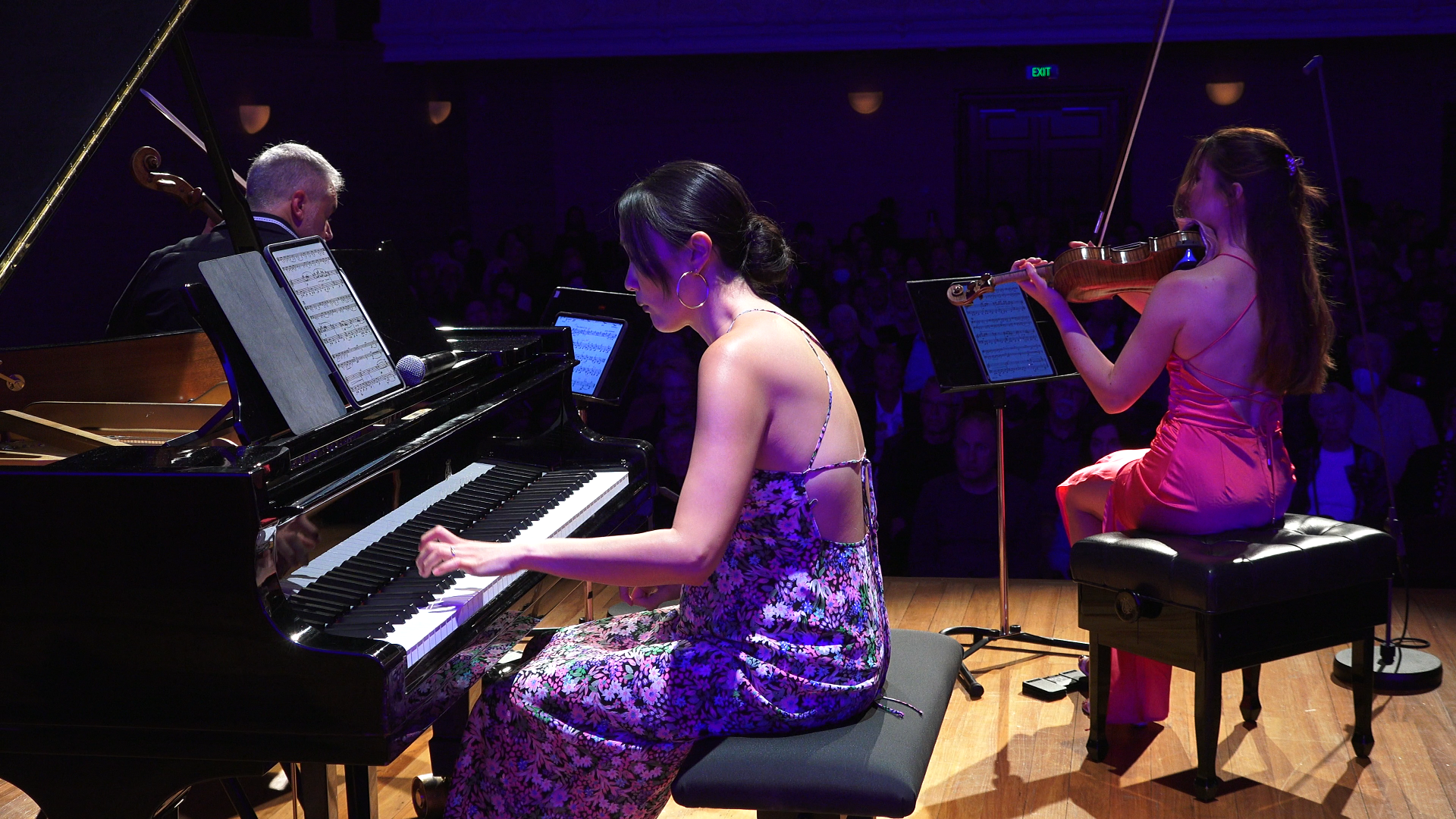NZTrio Winners Concert: Impetus
21oct7:00 pmNZTrio Winners Concert: ImpetusImpetus: Auckland
Event Details
What would you choose to shine a spotlight on? This was our brief to tertiary level composing students across Aotearoa New Zealand for this year’s 3rd biennial NZTrio Composing Competition.
Event Details
What would you choose to shine a spotlight on? This was our brief to tertiary level
composing students across Aotearoa New Zealand for this year’s 3rd biennial
NZTrio Composing Competition. They’ve blown us away with their thought-provoking musical renditions of what’s meaningful for them and why we should listen.
After dozens of entries and a few live workshopping sessions up and down the country,
we are proud to present to you the nine winning works performed
live in Auckland on Monday, October 21st.
Ewan Collins: Tinnitus of a City
Rakuto Kurano: Fantail in Tokyo
Nathaniel Otley: …dimension of loss
Kassandra Wang: Matakite for the Microbiome
Joshua Taylor: quirkdale
Robert Bryce: Caillte
Ming Shi: Villager’s Whisper
Ihlara McIndoe: (ir)rationality
Liam Pram: Auckland Housing
We hope you will join us in celebrating NZ’s extraordinary young talent!
Winners Concert
Auckland School of Music Theatre
Friday October 21st • 7pm, 6 Symonds Street, Auckland
No bookings required / General Admission
Special thanks to APRA AMCOS and the Universities of Canterbury, Waikato, Otago, Auckland, and Wellington for their support.
Time
October 21, 2019 7:00 pm UTC+12:00(GMT+00:00)
Location
Auckland School of Music
Programme Notes
Ewan Collins (NZ; b. 1999)
University of Auckland / 3rd year
Tinnitus of a City
Noise pollution is scarcely talked about, but it’s slowly contributing to the degradation of our hearing. The volume of sound it takes to cause permanent hearing damage is scarily close to the regular volume of a city. On top of that, our technology is also often used in ways that are unknowingly reducing our ability to hear. As our hearing gets fainter, the ringing in our ears simultaneously gets turned all the way up until even the momentary silences that life allows will be filled with the piercing tone of tinnitus. This is our collective degradation of the ears: the tinnitus of a city.
Rakuto Kurano (JPN; b. 2000)
University of Canterbury / 2nd year
Fantail in Tokyo
“Am I a Japanese composer or a New Zealand composer?”
This is a question I’ve started asking myself. I am a citizen of Japan, but a resident of New Zealand. Born in Japan, but I have spent most of my life in New Zealand. Fantail in Tokyo takes me on a journey exploring my identity as both a Japanese and New Zealand composer. The piece is composed using many idioms of Japanese pop music, whilst gaining inspiration from the New Zealand Fantail.
During the composition process of this piece, I came up with an answer to my initial question.
I am both a Japanese and New Zealand composer.
A Fantail wanders into the city of Tokyo.
A busy city that never goes to sleep.
Flying between the high-rise buildings,
the Fantail explores the city.
Will it call Tokyo its new home?
Nathaniel Otley (NZ; b. 1997)
University of Otago / 4th year
…dimension of loss
“…dimensions of loss” is a statement about one of the major ecological crises currently affecting the planet. The loss of global biodiversity, and in forests in particular, is starting to have noticeable and catastrophic effects on the wider environment across the planet. In particular, the mass loss of insect life due to climate change and human intervention (including pesticides and habitat destruction) is something that gets far too little attention. Especially when one considers the effect loss of insect life could have on the planet. Insects carry out essential processes in almost every ecosystem, providing pollination, recycling of nutrients, and food for other organisms and the mass extinction of insects is likely to prove catastrophic without a conservation intervention. Unfortunately, it tends to be easier to rally support for single larger animals than the cause of insects as a collective and as such little is being done currently to solve this important and pressing problem.
This issue is addressed in music by using small and delicate sounds, and a tactile approach to the sound of the violin, cello and piano. The material is developed at extremes of the instruments, in ways that are often not the usual method of playing; but that are exploring ways or aspects of playing and sound that are overlooked or taken for granted when the instruments are played normally. Themes and melodies often consist of quite small cells of pitch material but they are developed in such a way that the collective texture is often constant and evolving. The theme is therefore represented in bot literal and abstract ways. In a literal sense the music is paying attention to the smaller scale details and aspects of sound and the production of sound, scratches, rustling and quiet sound often being present. But more important is the abstract representation of the issue structurally. Insects prove an essential underlying basis to the natural environment, being the impetus for many ecological processes we take for granted. In the music, this is represented through underlying energy and the dynamism of the systems set in motion by the three instruments. As these systems lose their impetus, they become unstable and less regular, with tempo changes and unpredictable and disparate atmosphere changes happening with increasing and alarming frequency.
Kassandra Wang (NZ; b. 2000)
Victoria University of Wellington /2nd year
Matakite for the Microbiome
Matakite for the Microbiome highlights the urgency of increasingly pervasive antibiotic
resistance, threatening both human populations by rendering seemingly innocuous illnesses
uncurable, and transforming the global micro-biosystem in unforeseeable ways. This is a
crisis caused entirely by human action, and thus too can be mitigated by our actions, from
refusing to support overuse of antibiotics in large meat farms, to taking prescribed
medications correctly and avoiding unnecessary antibiotic soaps and cleaning products. The
increasing urgency and chaos in the piece reflect how as the clock ticks faster towards an age
where we are again helpless against even the mildest of infections, time is the essence.
Joshua Taylor (NZ; b. 1995)
University of Auckland / 4th year
quirkdale
[quirkdale] is an ongoing series of vignettes in progress for piano trio inspired by the quirks, mannerisms, personalities and neurodiversity of creative personalities. Evoking tangential musings, painterly spaces, millennial Bohemianism, gazes into liquid ambers, symbolic erotica and a relentless concern for colour, the work attempts to capture varying attributes and temperaments of creatives. Neurodiversity and its manifestations through creativity and the wider concern of the role of creatives and art is integral to many contemporary issues.
Robert Bryce (NZ; b. 1988)
University of Canterbury / 5th year Masters
Caillte
A people lost within another culture is the personal issue that inspired this work. Caillte is
the Gàidhlig (Scots Gaelic) and Gaeilge (Irish) word for lost. This is something I have
witnessed in the last year as I have personally started learning about my own ethnicity.
From doing this I came across my native tongue which is the living essence of my people.
My inheritance from the lands of Alba (Scotland)and Éire (Ireland). The gift from my
ancestors, both that make me an Albannach and Éireannach, as well as a Gael.
Sadly, this is diminishing, as our people from centuries of oppression and suppression have
turned their back on the very thing that makes them a people. A language that stretches
back for several millennia and has slowly been declining to the point our own children do
not know, understand or have access to the tongue of our people. A people that have been
resilient for thousands of years are finally losing the most important element of the culture
due to racism, ignorance and a lack of education around the subject.
As my journey continues to unfold there are many challenges that face me as I go. The
language is unfamiliar with new sounds, grammar and a way of thinking/being. I am
challenged with racist thinking and lazy rhetoric around the language. A stance that has
even been adopted by my own people. But I persist in my journey of self-discovery as I
stumble and fall. A journey of discovery that is echoed in the music. A journey I wish my
people would join me in. Breathe life into our language and allow it to give our people a
voice again. A beautiful voice that is being lost and will be if we do not choose to be it.
A poem that illustrates this issue from an unknown author:
An Ghaeilge
Is mise an Ghaeilge
Is mise do theanga
Is mise do chultúr
D’Úsáid na Filí mé
D’Úsáid na huaisle
D’Úsáid na daoine mé
is d’Úsáid na lenaí
Go bródúil a bhí siad
Agus mise faoi réim.
Ach tháinig an strainséir
Chuir sé faoi chois mé
Is rud ní ba mheasa
Nior mhaith le mo chlann mé
Anois táim lag
Anois táim tréith
Ach fós táim libh
Is beidh mé go beo.
Tóg suas mo cheann
Cuir áthas ar mo chroí
Labhraígí mé
Ó labhraígí mé!
The Irish Language
I am Irish
I am your language
I am your culture
The poets used me
The nobles used me
The people used me
and the children used me
Proud they were
And I flourished
But the stranger came
He suppressed me
Something worse than that was
my own people rejected me
Now I am weak
Now I am feeble
But still I am with you
and I will be forever.
Raise up my head
Put joy in my heart
Speak me
Oh speak me!
Ming Shi (CHN; b. 1988)
Victoria University of Wellington / 5th year
Villager’s Whisper
One of the main issues I feel in 2019 is the need to revitalise and centralise the place of the arts in society. A lot of emphasis has been placed on STEM subjects, but the arts are where people learn to express, to question, to communicate and to critique complacency in society. As a composer, I face this issue when seeking out performances with exceptional, lively performers who have a similar questioning attitude to the received history and culture of their ensemble. This is the truly and most direct source which drives me to compose the piece. NZTrio is a fantastic ensemble, and they have directly contributed to the revitalising of innovative chamber music in New Zealand, both honouring and questioning the legacy of piano trio repertoire. When I saw this opportunity, I told myself I have to write a piece and join in.
To sum up, my issue is to work with a top ensemble that have an innovative, critical
approach to their repertoire, and to use that energy as inspiration for a new work. I felt very
happy during this compositional process, and benefitted from the experience. This drives
me and inspired the ideas of this new composition.
Ihlara McIndoe (NZ; b. 1997)
University of Otago / 3rd year
(ir)rationality
Society’s expectation is that the law is fair, objective, and just. In reality this is far from true.
The law is biased in many ways. Biased against indigenous people, biased against minorities, biased against women, the list goes on. This work is inspired by the continuing issue of biased drafting and application of the law.
The law, particularly in the criminal sphere, rests on the concept of “the reasonable man”, a
perspective that developed through the analysis of white, well-educated men. Our laws are framed around an Anglosaxon tradition; a tradition that has spent the last 180 years breaking down bonds of whanau (family), disregarding tikanga (Maori custom), discouraging and at times banning te reo (the Maori language), and denying Tino rangatiratanga (Maori right to independence). A tradition that has led to a long judicial history of framing women as irrational and frivolous, where it is the State’s role to determine whether a woman is sufficiently “worth” enough to receive sympathy or assistance. A tradition that has resulted in legislation still in force today which grants the State not only control over women’s bodies, but also the right to make a judgement of a woman’s mind.
This work is inspired by the juxtaposing supposed intention versus the actual reality of law. The law is supposed to be fair and rational. However, for those who do not fit the hegemonic ideal of rationality, the New Zealand criminal justice system does not seem just at all.
Liam Pram (NZ; b. 1990)
University of Auckland / 2nd year
Auckland Housing
Retorts against the densification of many suburbs in Tāmaki Makaurau often seem to deal in aesthetics. That
damage will be done to some of the most “beautiful” suburbs, and protections need to be put in place for “Heritage” housing.
There is something disingenuous happening here. Suburban sprawl, the desire for individual homes, the
kiwi backyard, all spewing from an unbalanced sense of heritage. The prospect of government protections for
colonialist English heritage should make us all feel a healthy skepticism in Aotearoa.
This musical work germinates from encouraging some of the progress being made through the Auckland Unitary Plan, and other state and social initiatives creating opportunities for growth throughout the city, and
questioning of the values vocalised by those opposed, and its allegiance to a problematic sense of national
identity.
As a poetic work, I don’t believe this musical composition has any direct commentary on these ideas. It may simply offer itself as a fan of complexity, pluralism, and the aesthetic pleasures gained when opportunities are open to all kinds of density.


